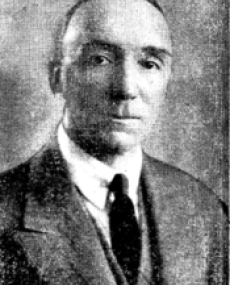
Richard Feetham was born on 22 November 1874, Penrhos Monmouthshire, England. His father was the Reverend William Feetham, Vicar of Penrhos, Raglan, England and his mother, Mary, the eldest daughter of the Venerable Archdeacon William Crawley.
After spending his early years in an English country parsonage, Feetham was educated at Marlborough College and New College, Oxford, England where he graduated in 1897. In April 1899 he enrolled at the Inner Temple, London to study law.
Having volunteered for service in the Second Anglo Boer War (Second South African War) with the Inns of Court Rifles, he came to South Africa in 1902, when on the recommendation of Lionel G. Curtis he was appointed deputy town clerk and subsequently Town Clerk of Johannesburg from 1903 to 1905.
He formed part of Lord Alfred Milner’s ‘Kindergarten’, charged with the task of reconstituting local government in the Transvaal (now Gauteng). He resigned in 1905 when he was admitted to the Transvaal Bar and from 1907 to 1910 and again from 1912 to 1923 acted as legal adviser to the British High Commissioner for South Africa. He was a member of the Transvaal Legislative Council from 1907 to 1910 and represented Parktown in the Union House of Assembly, first as a front bencher of the Unionist Party (1915””1920) and then as a member of the South African Party (1921””23). He played a leading part in promoting the private act which transformed the University College in Johannesburg into the University of the Witwatersrand, Johannesburg.
After serving in the First World War (1914””18), Feetham took silk in August 1923 and was appointed to the Bench of the Transvaal Division of the Supreme Court. In 1930 he was appointed Judge President of the Natal Provincial Division and in 1939 a Judge of Appeal in Bloemfontein. His legal career ended in 1945 with his retirement at the age of seventy. As a classical scholar he completed a revision of Crawley’s translation of Thucydides’ Peloponnesian War (1903) and also contributed several articles on law and constitutional issues to the Defenders of the Constitution series (1953””56).
Feetham was appointed Chair of various commissions both in South Africa and abroad. These included the Southborough Committee on Constitutional Reform in India (1918””19), the Irish Boundary Commission (1924””25), the Kenya Local Government Commission (1926), the Shanghai Municipal Council Commission (1930””31), the Transvaal Asiatic Land Tenure Commission (1932””35), and the Witwatersrand Land Titles Commission (1946”” 49).
In 1938, Feetham was elected Vice Chancellor of the University of the Witwatersrand, Johannesburg, and in 1949 became chancellor. He staunchly upheld the principle of academic autonomy and opposed legislation prohibiting the admission of “Non-White” students to White tertiary institutions. He played a leading role in the conference between senior members of the Universities of Cape Town and the Witwatersrand, Johannesburg, which led to publication of the booklet, The Open Universities in South Africa (1957). He resigned from the chancellorship in 1961 and from the university council two years later.
Feetham had a deep interest in child welfare and was in 1907, one of the sponsors of the Children’s Adoption Act, assisted in the formation of the Hope Training Home in Westciff, Johannesburg, and was chairman of the Cripple Care Association of the Transvaal. In 1961 he was accorded an Ad Portas reception by Michaelhouse College, Natal (now kwaZulu-Natal), in recognition of his services on the governing body of the school.
In 1924 he was appointed Companion of St Michael and St George (C.M.G.) by the Bitish Monarchy. Further distinctions were the honorary degrees of Doctor of Laws conferred on him by the Universities of the Witwatersrand, Johannesburg (1949), and Natal (1958).
In 1920, Feetham married Leila Christopher of Ladysmith, Natal. They had a son and two daughters. The son, Richard also practised at the Bar.
Judge Richard Feetham passed away on 5 November 1965 in Pietermaritzburg, Natal (now kwaZulu-Natal).